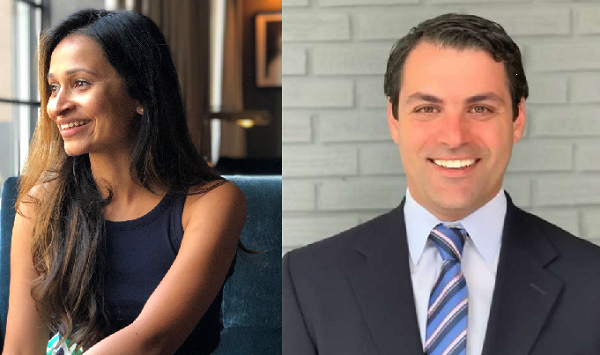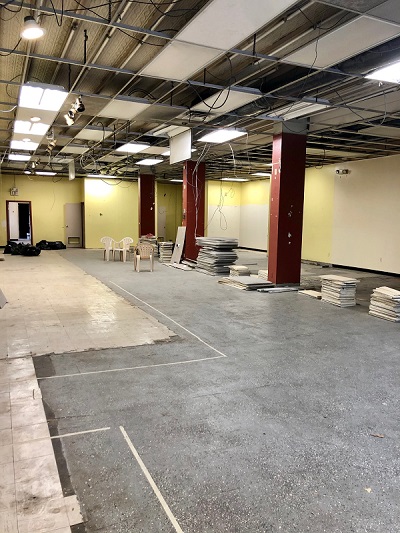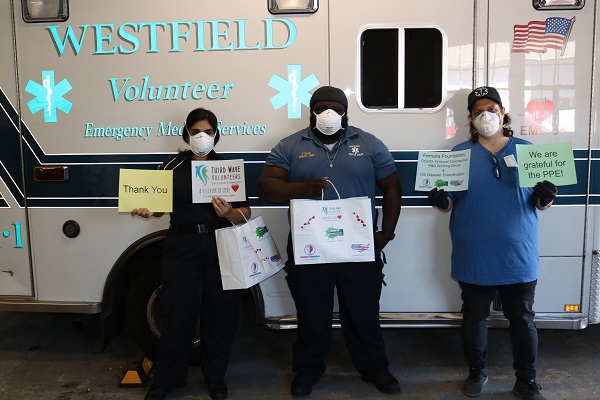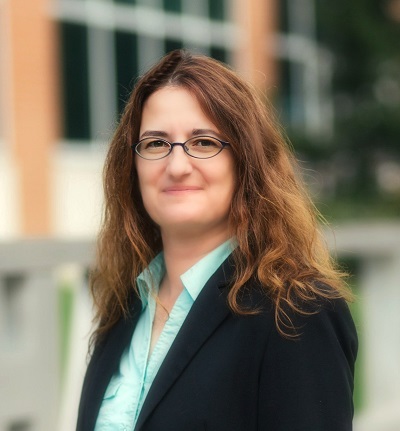Pandemic Pivot: How the Realities of Working in the Suburbs Spurred Sneh Kadakia to Create “from Here”
Sneh Kadakia was about to launch her first startup, which promised to solve on-demand, no-commitment workspace needs, essentially creating an “Airbnb” for coworkers in cities across the country.
Then came the pandemic. Everything stopped.
“It was painful to finally get to that point where we were about to launch our pilot in two weeks, and then the entire world stopped. The coworking industry came to a screeching halt. It was almost unfathomable,” said Kadakia.
She planned to wait it out. “But I was sitting at home with my three-year-old son, a couple weeks into this, eating Pop-Tarts and watching PAW Patrol, wondering what my next step would be in this journey.”
Now, a year later, she is back, launching her next startup — called “from HERE” — with a strategy to create “retail-style” workspaces, filling the needs of all professionals at locations closer to their homes, she said.
She recently broke ground on “from HERE’s” first location, in Plainfield. She and her business partner, Scott Sussman, are taking a distressed former liquor store and renovating it into a workspace for the community. They have another spot in Princeton Junction, expected to open shortly after, and they predict that more locations will follow.
She discussed her past year at a Jersey Shore Startups event on March 24 titled, “How to Pivot During a Pandemic,” which focused on the highs and lows of her journey.
Before “from HERE” was created, Kadakia was the founder and CEO of Lokus. “We developed a technology platform that enabled people to book hourly and daily tables and desks at hotels on our platform. The hotels were excited because it allowed them to monetize and operationalize their unused, underutilized spaces, such as studies, lounges and lobbies by attracting untapped working professionals in the city to their doors,’’ she said.
“We encouraged additional spending on-site such as food and beverages, and gym and spas, through the platform, which also benefited the hotels and provided professionals with a holistic, one-stop experience,” she said.
“Our New York City pilot was scheduled for April 2020,” she said, noting that it’s been indefinitely suspended.
Early in the pandemic, she started to witness a growing need for locally accessible workspaces. “But there wasn’t another local spot that had the services catering to the on-demand workspace needs of work-from-home professionals. Offices were inaccessible. The libraries were closed. Starbucks was unreliable, and we had nowhere to go outside of our homes.”
People were slowly acclimating to working from home, while the dust settled on a new normal with changing routines. There was a pent-up demand to work in an office setting. But people were limiting trips in and out of the cities, or their employers were letting them work from home indefinitely. They wanted to stay close to home and also have access to a flexible, reliable workspace, Kadakia said.
“Those stories led me to be like, okay, maybe there’s something we can do here in the suburbs to address this pain point. But it’s not going to involve hotels, given the state of things at the time. It’s going to have to be real estate-oriented. And, of course, the commercial real estate industry was unfortunately impacted at the same time, which gave us a unique window to explore opportunities in that sector,” Kadakia said.
She thought that she had the makings of a good idea, and picked up the phone. “I called commercial real estate agents and I literally just started going out there and selling an idea. No business plan, nothing but just trying to see if I can formulate something that could potentially turn into; you know, another iteration of Lokus. I found people who were willing to listen to the idea, and that helped me think about what would work and wouldn’t work in a commercial real-estate setting,” she said.
That’s how she met her business partner, Scott Sussman, a former community operations manager at WeWork, which is a major flexible workspace provider in the same industry. He is now the head of operations and business development at “from HERE.”
“He had experience that I was missing across coworking and hospitality. And he had a similar vision for the community, but just didn’t know what the right solution was until we started to have a conversation about it. And that’s really how we ended up working together,” she said.
“We are trying to think about commercial real estate in a different way because it is a very traditional industry. And doing something creative in that sector and selling an idea that hadn’t really been done before, especially in the suburbs, was a large part of the challenge,” she said.
“Early on, we knew the pandemic was going to change people’s behavior when it came to the way that they interacted with their companies and their jobs and employers, and their day-to-day work styles,” she said.
“Employers realized that their employees could be productive from home. Most of us didn’t need to be in the office every single day. There are tools and technology that can be placed out there to help people balance both collaboration and productivity,” she said.
“So, if you’ve been following the news, most companies are reducing the size of their workspaces, or allowing people to work from home or giving them choices: if they want to come into the office, how frequently. And they really started to think about the lifestyles and mental health and wellness of their employees,” she said.
“This was a genuine transformation in the way that people work. And with that change, we saw many people moving out of metropolitan areas to attain better, more balanced lifestyles,” she said.
“We personally saw people moving out of New York to New Jersey; and with that shift, we started to hypothesize that our communities were going to be places where people are going to live, play, and now also primarily work,” she said.
“But we realized [that], particularly with the professional population we were targeting in the suburbs, we needed to make our workspace feel safe, comfortable and accessible to everybody. And, so, the word ‘neighborhood’ became something very powerful in our messaging.”
The journey hasn’t always been easy.
“I was on a phone call with a very famous developer in the area. We pitched them the idea. And the first thing that they said was, ‘That is the stupidest thing I’ve ever heard.’”
“Obviously that’s a lot of really hard feedback to get when you’re betting your career on it,” she said.
“But the advice becomes invaluable when we asked them, ‘What didn’t resonate with you, given your experience?”
“And, very quickly, they listed everything wrong — from the price, and size and lease. We all gained this knowledge and used it proactively with the next call with another developer,” she said.
“And the more that you can take that criticism, the better and better and better your ideas are going to get. I’ll be the first to admit it’s extremely hard to get feedback, especially when it’s not supporting your idea, but, rather, conflicting with it. But the only reason we got here today is because all that feedback helped us pivot.”





